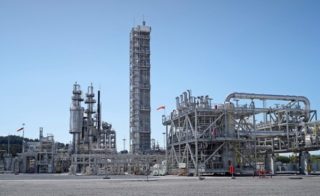-
CCUS announcements come thick and fast in last fortnight
Date posted:
-
-
-
Post Author
Patrick LaveryCombustion Industry News Editor
-
-
![]()
A flurry of announcements related to carbon capture, utilisation and storage projects and partnerships have been made in the past fortnight, giving a sense of real impetus to the technology. Among the major moves have been:
- The European Union announcing funding for four CCS-related projects (as well as three other decarbonisation projects) through the EU Innovation Fund, sharing €1.1 billion. A number of these projects had already been announced but were waiting on additional funding to continue. The projects include:
- The SHARC project at the Porvoo refinery in Finland, to move from ‘grey’ hydrogen production to ‘blue’ hydrogen using CO2 capture and ‘green’ hydrogen from renewable energy. Storage for the carbon captured during production of the blue hydrogen will be in the North Sea. The project is being carried out by Neste Oyj.
- EQIOM, Air Liquide, and VDZ’s ‘K6 Program’ at the Lumbres cement plant, France, near the port of Dunkirk. The programme aims to maximise biomass and other alternative fuels, while using an oxy-fuel kiln with carbon capture, reducing overall CO2 production by more than 90%. Some reuse of the CO2 will be made within concrete production and otherwise there will be storage of it in the North Sea.
- Air Liquide and BASF’s ‘Kairos-at-C’ project at the Port of Antwerp in Belgium to reduce emissions from two hydrogen plants, two ethylene oxide plants and an ammonia plant, using CCS. Liquid CO2-carrying vessels will be part of the project, with storage in the North Sea (Norway, the Netherlands, and/or the UK).
- SSAB’s ‘HYBRIT’ (Hydrogen Breakthrough Ironmaking Technology) steelmaking project in Sweden that is to use hydrogen as its chief fuel, producing zero-carbon emissions. The project will produce approximately 1.2Mt crude steel annually, 25% of Sweden’s total production, reducing greenhouse gas emissions by 14.3Mt CO2 over the first 10 years of operation. A new facility will be established for first-of-a-kind hydrogen-based direct reduction, with 500MW fossil-free electrolysis in Gällivare, and two blast furnaces are to be replaced by an electric furnace in Oxelösund.
- (Another project being funded is the Ecoplanta project in Spain, by Ecoplanta Molecular Recycling Solutions, to convert non-recyclable fractions of municipal solid waste to chemicals and biofuels, including methanol.)
- Talos Energy and Freeport LNG announced they had executed a letter of intent to develop the Freeport LNG CCS project, around 100 kilometres south-west of Houston, close to the port of Freeport, on the US Gulf Coast. Injection is expected to begin in 2024, with Storegga Geotechnologies Limited also being involved in the project.
- Malaysian oil and gas company Petronas announced it would work with ExxonMobil to explore opportunities to decarbonise Malaysia’s upstream industry and provide storage solutions for Asia. An ExxonMobil study found there is over 300 billion tonnes of storage capacity in Southeast Asia alone.
- UK waste group Cory announced it would build what might be the world’s largest single-site energy-from-waste decarbonisation project, with CCS to be applied to the company’s existing EfW facility at Belvedere, London, capturing 90% of emissions. It is expected to be up and running by 2026, and will be another project shipping liquefied CO2 to the North Sea.
- A memorandum of understanding was signed between Norway and the Netherlands to promote bilateral cooperation in the field of CCS in addition to exploring future areas of energy cooperation related to the North Sea.
- Norway’s Lime Petroleum said it would join with Nautilus Carbon Services to participate in a carbon capture and storage development.
- The European Union announcing funding for four CCS-related projects (as well as three other decarbonisation projects) through the EU Innovation Fund, sharing €1.1 billion. A number of these projects had already been announced but were waiting on additional funding to continue. The projects include:

